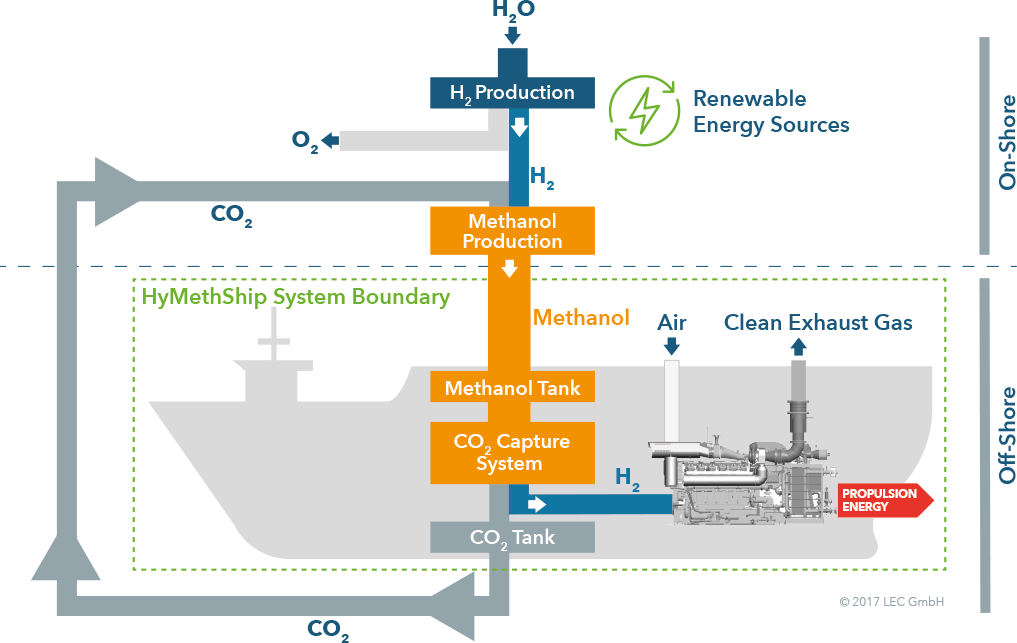GREEN
REVOLUTION
ON THE
HIGH SEA

Emission-free Shipping
Innovative System
Excellent Consortium

HyMethShip System
HyMethShip system innovatively combines a membrane reactor, a CO2 capture system, a storage system for CO2 and methanol as well as a hydrogen-fueled combustion engine into one system. The proposed solution reforms methanol to hydrogen, which is then burned in a conventional reciprocating engine that has been upgraded to operate with multiple fuel types and specially optimized for hydrogen use. The drastic CO2 reduction is the result of using renewable methanol as the energy carrier and implementing pre-combustion CO2 capture and storage on the ship. The renewable methanol fuel bunkered on the ship is ideally produced on-shore from the captured CO2, thus closing the CO2 loop of the ship propulsion system.
The HyMethShip project will undertake risk and safety assessments to ensure that the system fulfills safety requirements for on-board use and that its safety is at least equivalent to that of conventional ship fuel and propulsion systems. It will also take into account the rules and regulations under development for low flashpoint fuels and is expected to contribute to regulatory development in this area.
The cost effectiveness of the system for different ship types, applications and use cases will also be assessed. For medium and long-distance waterborne transportation, the HyMethShip concept is considered to be the best approach available that achieves this level of CO2 reduction and is economically feasible. Developing this solution can help the European shipping industry maintain its global advantage as a producer of technically advanced ships and equipment.
NEWS
Hydrogen-based innovation could help shipping go green
While demand for global shipping increases, the sector is under huge pressure to cut emissions.
MoreInternational Young engine professionals got insight in HyMethShip
Hymethship was the first presentation given at the CIMAC CASCADES, an international seminar for young engineers and students.
MoreA rendez-vouz of experts for sustainable propulsion technologies in Graz
Hymethship was discussed at the symposium “Sustainable Mobility, Transport and Power Generation” on 23rd and 24th of September in Graz.
MoreHyMethShip at Blue Week 2021
Results from Hymethship were presented at the Zero Emission Seminar, 1 June, of the Blue Week 2021
MoreAviso: Blue Week 2021
Results from Hymethship will be presented at the Zero Emission Seminar, 1 June.
MoreGet an update on HyMethShip at the 2nd LSSTF
HyMethShip is among the projects presented at the online conference on Wednesday, April 28
MoreRegister for the 2nd LSSTF
The 2nd LEC Sustainable Shipping Technologies Forum will be held from April 27th to 28th, 2021
MoreEnsuring the safe operation of a “HyMethShip”
The complete system was thoroughly checked in a 3 days team workshop.
More

The innovation potential and the extent to which the project surpasses the current state of technology is excellent. HyMethShip optimizes and implements technologies that have never been used in shipping to date and have the potential to eliminate sulfur and CO2 emissions.

Through this multi-million euros project, Graz and Graz University of Technology are once again in the limelight as the international center of modern large engine research. At the interface between fundamental and applied research, the LEC and its top-class partners from science and business are taking a quantum leap to the next generation of large engines. This will bring the industry a lot closer to implementing environmentally friendly engine technology.

The proposed concept is a potential way to store large amounts of renewable energy over a long period of time and to have de facto emission-free ship propulsion. In theory and on a laboratory scale, the concept works. In the next step, a demonstrator will be built to optimize the system and the technological building blocks. The challenge lies in the scaling and interaction of the individual technological components.

On the one hand, all currently imaginable solutions require a completely new system, from the production of the energy carrier, to its distribution, to the fueling process and on-board storage, and finally to energy use. On the other hand, challenging safety issues must be resolved and certified in elaborate approval procedures. A complex ecosystem of partners must recognize sufficient advantages and join forces in a partner network. The HyMethShip consortium shows that this is possible.


